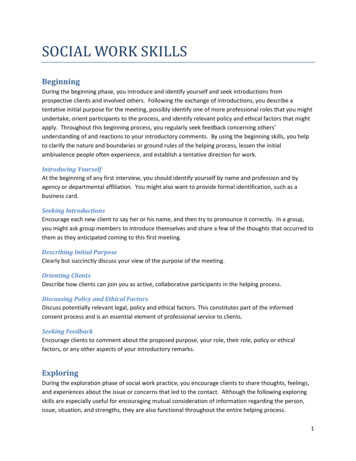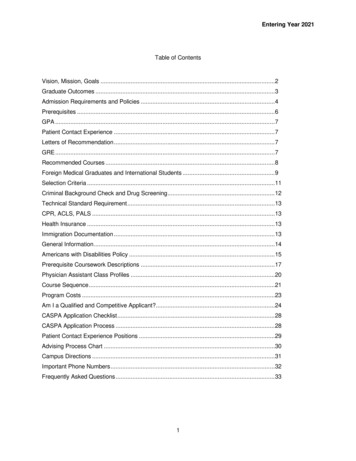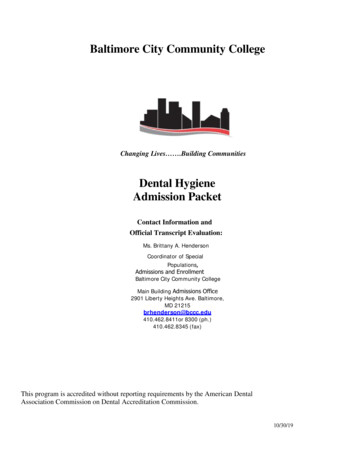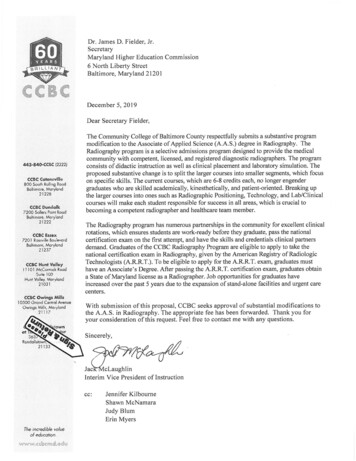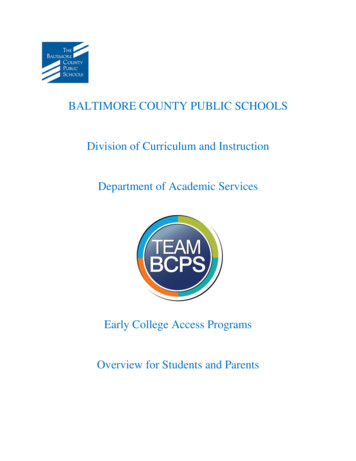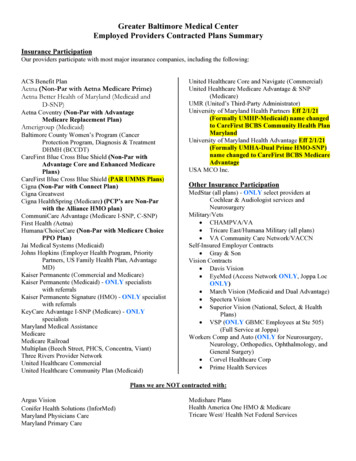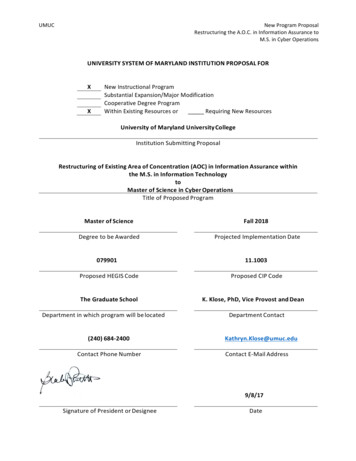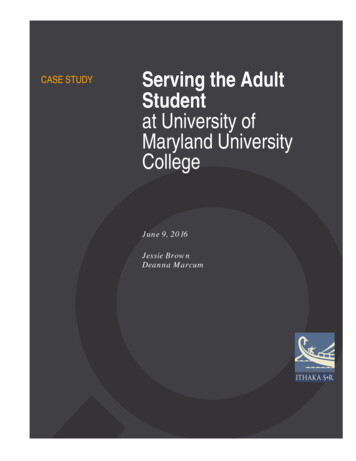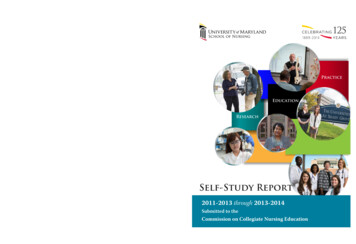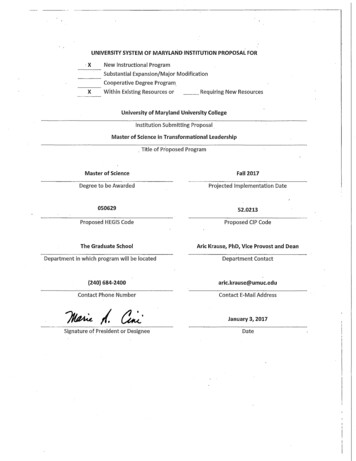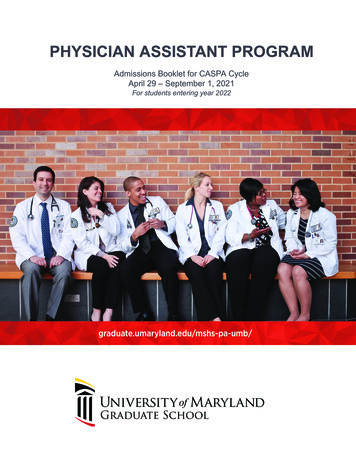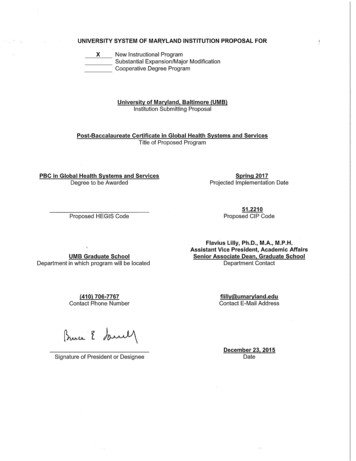
Transcription
UNIVERSITY SYSTEM OF MAR[YLAND INSTITUTION PROPOSAL FORXNew Instructional ProgramSubstantial Expansion/Major ModificationCooperative Degree ProgramUniversity of Maryland, Baltimore (UMB)Institution Submitting ProposalPost-Baccalaureate Certificate in Global Health Systems and ServicesTitle of Proposed ProgramPBC in Global Health Systems and ServicesDegree to be AwardedSpring 2017Projected Implementation DateProposed HEGIS CodeProposed CIP Code51.2210UMB Graduate SchoolDepartment in which program will be locatedFlavius Lilly, Ph.D., M.A., M.P.H.Assistant Vice President, Academic AffairsSenior Associate Dean, Graduate SchoolDepartment ContactContact Rhone Numberflilly@umaryland.eduContact E-Mail AddressSignature of President or DesigneeDecember 23, 2015Date(410) 706-7767
Proposal forUNIVERSITY OF MARYLAND, BALTIMORE (UMB)Post-Baccalaureate (Graduate) Online Certificate inGlobal Health Systems and ServicesThis proposal is for a new online Post-Baccalaureate graduate Certificate in Global HealthSystems and Services (PBC in Global Health Systems and Services or PBC in GHSS) in apartnership between UMB and UMUC.This proposed new twelve credit online PBC in GHSS will draw its students primarily fromUMB alumni and other already practicing health care professionals. It will be taught online. Itsfocus is to introduce basic global health systems and services to current health professionalsinterested in shmi or medium term consultation/projects overseas and subsequent oppmiunities.The students will most likely be ah·eady trained/licensed experienced practitioners.This online certificate will be offered in patinership with a new UMUC proposed Online Post Baccalaureate Ce1iificate Global Health Management (PBC Global Management), beingsubmitted separately to MHEC!. Both online certificates will share two common core courses.UMUC and UMB have drafted a Memorandum of Understanding (MOD) to articulate shareddelivery of the first two courses, including hosting of courses, faculty, student enrollment in eachprogram, and confidentiality of student information.This UMBIUMUC partnership takes advantage ofUMB's extensive graduate health professional,clinical, practice, and global expertise and UMUC's extensive online and health managementexpe1iise. It offers UMB and UMUC graduates and students interested in global healthmanagement and global health systems and services options unavailable through their homeinstitutions.A. Centrality to institutional mission statement and planning priorities:Online PBC in GHSS link to UMB Mission and Strategic PlanPurpose:The purpose is to give expertise in global health to post baccalaureate individuals employed orseeking employment in positions requiring this knowledge. The PBC in GHSS is particularlyfocused toward practicing professionals with a health background.Link to UMB's mission:"The University of Maryland, Baltimore, is the state's public health, law, and human servicesuniversity devoted to excellence in professional and graduate education, research, patient care,and public service . We educate leaders in health care delivery, biomedical science, globalhealth, social work and the law. We emphasize interdisciplinary education and research in an1
atmosphere that explicitly values civility, diversity, collaboration, teamwork and accountability."Our proposed certificate directly responds to several elements of the mission statement,patiicularly those related to global health and interdisciplinary education, training, and caredelivery.Link to three ofUMB's Strategic Planning Themes:Four years ago, the university embarked on a strategic planning process that has energized thecampus community. Teams remain very active to achieving the five-year goals laid out in thethemes. The proposed certificate expansion suppmis three of these eight themes. Theme 2: Promote Diversity and a Culture oflnclusiono Goal 3: Cultivate the idea that cultural competency is the right thing to do andpromote it as a competitive advantage to be attained and valued by faculty, staff,and students. Offer a training program that prepares faculty and staff to be influentialleaders, advocates, and spokespeople for cultural competency initiatives Theme 4: Excel at Interdisciplinary Research and Interprofessional Education, ClinicalCare and Practice, and Public Serviceo Goal2: Develop and sustain an infrastructure that suppmis interdisciplinmyresearch, interprofessional education, clinical care and practice, and public serviceand is integrated with all the schools on this campus Theme 5: Develop Local and Global Initiatives that Address Critical Issueso Goal 3: Prepare faculty, staff, students, and community partners to be leaders andactive civic pa1iicipants in local and global engagementThe proposed online certificate is directly tied to these three themes. It promotes culturalcompetency and diversity for health related work both at home within Mmyland's growingmulti-ethnic populations and throughout the world. It promotes interprofessional health caretraining because all the courses are open to all health professionals in the certificate programsand course material is designed to foster cross discipline discussion and problem solving.UMB has committed significant resources to expand global education opportunities includingestablishing a Center for Global Education Initiatives which sponsors the interprofessional globalhealth facuJty and student grant programs. The director of the center is the co-author of this PBCin GHSS proposal.B. Adequacy of curriculum design and delivery to related learning outcomesDescription Outline of Partnership between UMB and UMUCIn Fall, 2013 and Spring 2014 UMB and UMUC piloted a joint graduate course in GlobalChallenges in Women's and Children's Health. The Course was offered online to graduatestudents in both institutions and team taught by faculty from both institutions. Seventeenstudents completed the first pilot class and 34 sh1dents completed the second class. The secondcourse had a waiting list. Backgrounds of the enrolled students included first generation2
Americans, recent immigrants, and students representing the rich diversity of the greaterBaltimore/Washington area. Students commented that the course had helped them work in innercity Baltimore and areas of Maryland with significant immigrant communities.Student evaluations were very positive, with students noting how the course had broadened theirhealth care expertise and exposed them to faculty with global experience. All of the studentswho participated in the pilot were cunent students at either UMUC or UMB and cmmnentedabout appreciating the online structure and getting "a better understanding" of the differences incountry health care delivery systems.From this pilot test, UMB and UMUC created a partnership to offer two certificates, one inGHSS (UMB) and one in Global Health Management (GHM) (UMUC). The schools wouldjointly teach the first two courses that provide the general skills needed to then specialize in oneof the cetiificate areas. Later courses would be taken at the respective campus. When enrolling,individuals would enroll as UMUC students if they want a PBC in Global Health Management oras UMB students if they chose a PBC in GHSS.This cetiificate proposal is based on the positive results of a joint interprofessional pilot courseoffered Fall and Spring semesters, 2013-2014, for both UMB and UMUC students. The proposedonline cetiificate significantly broadens and refocuses the base of potential students by reachingout to practicing health professionals. Many of these health professionals will be UMB alumni, amarketing priority.List of eligibility requirements and courses within this UMB/UMUC partnership Four course, 12 course credit program for an online PBC in global healtho . Systems and Se1·vices (UMB)o Management (UMUC) Eligible students for both programs include those:o Having at least a baccalaureate degree and meeting other administrativerequirements established by the respective graduate schools. Systems and Services (UMB): Practicing health professionals with a terminal health degree andinterest in global health UMUC students with tetminal health degree, Management (UMUC): Professionals with a bachelor's degree from an accreditedinstitution plus three to five years of health care experience, Cunent UMUC graduate students, Cunent UMB graduate students UMB Courseso Two core courses offered jointly by both universities and required of certificateseeking students at either university,o Two subsequent systems and services courses offered by UMB for thoseinterested in the systems and services certificate Shared Core Courses:3
Petspectives on Global Health (taught by both UMB and UMUCfaculty) "National and International Approaches to Health Care Delivery"(taught by both UMB and UMUC faculty) UMB Systems and Services Courses: Students select two courses, based onhealth care delivery interests from among the following (see attached coursedescriptions): Critical issues in Global Women's and Children's Health Global Health Law and Ethics Infectious Disease Epidemiology: A Global Perspective Health responses to Mass Violence and Disaster.UMUC Courseso Two core courses listed aboveo One subsequent management six credit course focused courses offered throughUMUC for those interested in a management certificate Strategic Management of Global Health ServicesJoint UMB/UMUC courses use UMB Blackboard platform. Subsequent UMB courseswill also use the UMB Blackboard.Campus grading protocols and registration will adhere to respective graduate schoolrequirements, depending on whether CGHSS or CGHM is selected.Students for CGHM will register through UMUC.Description of Proposed PBC in GHSSGoal: apply skills to improve delivery of global health systems, pqlicies, and servicesPBC in GHSS Objectives: Formulate global health systems and services Improve systems for quality of care and service delivety within different national healthsystems Plan health programs within diverse cultures that may have differing ethical values Produce global health policy and systems practitioners with understanding of globalhealth ethics, women's and children's health, health implications of mass violence anddisaster and/or infectious disease epidemiology.Learning OutcomesUnderstand the different intemational health organizations and their roles inpromulgating global health systems, policies, and procedures and organizing healthserviCesAssess and design global health programs within different national contexts Implement and evaluate global health programs to maximize contributions to effectivepolicy, enhanced practice, and improved and sustainable health outcomes Work effectively within diverse cultural settings and across national, and intemationalpolitical landscapes to maximize contributions to effective policy and enhanced practice. Build interdisciplinary teams and communicate with clinical providers, administrators,and patients using appropriate cultural practices.·4
Use a systems approach to health services management including strategic pla1111ing,budgeting, and resource allocation.Evaluation and assessment for the program will take place in the required courses, includingregular comse evaluations, review of grade distributions, and faculty review of studentperformance on embedded course assessments. Additional review includes tracking studentcompletion rates.Description of Two Core Courses required for all students for the PBC in Global HealthSystems and Services and the PBC in Global Health Management. Both courses are threecredits each.Perspectives on Global Healtho Course curriculum designers: Jody K. Olsen, PhD. MSW and Kathy Marconi,PhD, MPH (UMUC)o Course overview The course provides an overview to the field of global health. It introducesstudents to major global health challenges, programs, the determinants ofhealth and disease, cunent and emerging global health priorities, policies,evidence-based interventions, disaster relief, key legal issues, ethics, andmodels of reform. In addition, patiicular attention is given to building keystudent competencies in analyzing national and trans-national publichealth trends including major communicable and non-communicabledisease burdens, key organizations suppmiing public health, andprofessional opportunities in global health. Student skills are developed inanalysis, leadership, teamwork and communication in a global context. . National and International Approaches to Health Care Deliveryo Course cuniculum designers: Jody K. Olsen, PhD. MSW (UMB) and KathyMarconi, PhD, MPH (UMUC)o Course overview This course applies the concepts, theories, and principles of the field ofglobal health presented in the first course to the practical challenges facingglobal health professionals. Each student will select a specific globalhealth priority for a given national or geo-politically defined population toexamine over the duration of the course. The student's selected case willthen be their primary focus for applying needs assessment methodologies,including epidemiological methods, mapping local, national, and globalpolicy processes, identifying strategies for building infrastmcture andworkforce capacity, analyzing financial oppmiunities and limitations, andassessing the impact of macro changes in the global economy, politicalenvironment, and human rights and legal systems. Each student willcomplete a final summmy project report that will summarize fmdingsregarding scope, options, outcomes, and a recommended action plan forimproving the health status of the population group they have studied. 5
, , Description of four PBC in GHSS courses from which students can select two. All fourcourses are three credits each.Once students have completed the core introductory courses, they can choose tospecialize further in health outcomes related to women and children in low resourcedenvironments, infectious diseases, mass violence and disasters, or health delivery ethics and law.Note: Faculty listed for each course will be the course curriculum designer. Depending on thesemester, either the named faculty member or an adjunct faculty drawn from the UMB facultywill teach the course. In addition: Faculty members developing the course must work with a cutTiculum designer assignedby the Graduate School and adhere to Graduate School course stmctme requirements;The course must meet Graduate School quality standards criteria which includesadherence to the Quality Matters Program and other federal and state compliancerequirements;Faculty members must agree to actively participate and complete training and tutorialsfor developing and delivering courses in the Graduate School online learningmanagement system; and engage in ongoing course improvement to achieve and maintainQM distinction in a timely manner.The course content must be uploaded, delivered and managed through the GraduateSchool online leaming management system. 6 Critical issues in Global Women's and Children's Healtho Course cuniculum designers: Jody K. Olsen, PhD, MSW, Katherine Marconi,PhD, MS. In addition, individual faculty lectures drawn from UMUC and UMBschools.o Course overview A comprehensive multidisciplinaty examination of the complex issuesrelated to women and children's health across the globe, based on theWorld Health Organization's 2007 Framework for Action forstrengthening health systems and the United Nation's MillenniumDevelopment Goals and Universal Declaration of Human Rights. Topicsinclude biological and medical issues, reproductive health, violenceagainst women and children and its impact on health, infectious andchronic disease, and the relationship of environmental and social issues tohealth. Analysis also covers cunent national, regional, and global trends;program and policy responses to these trends; and prospects for the future. Health Implications of Mass Violence and Disaster.o Course cuniculum designers: Jodi Frey PhD, LCSW-C, Tanya Sharpe, PhD,MSW, and individual faculty lectures drawn from UMB schools and departments.o Course overview This course increases students' knowledge of how to apply differenttheories and intervention strategies to the health assessment and responseto mass violence and disaster. Crisis theory, used to guide crisis
:intervention and response to traumatic events, in additionJo preventionand preparedness among diverse groups and communities, will be studied.Multiple conceptualizations of exposure to human-made and naturaldisaster will be discussed, ranging from acute to chronic, complex andlong-term health and trauma reactions. The class will explore evidence based interventions, controversies and emerging areas of practice withvarious populations who experience trauma across multiple settings.Larger social, cultural, and political forces will be considered with regardto how they influence exposure, response and recovery from traumaticevents.7 Global Health Law and Ethicso Course cuniculum designer: Virginia Rowthorn, JD, LLM and individual facultylectures drawn from UMB schools and departments.o Course overview This course will be divided into two parts. The first part will consider thelegal frameworks and global govemance systems that have a regulatoryand normative role in global health, with an emphasis on human rightstools and the World Health Organization. The course will also considerthe strengths and limitations of intemationallaw as a tool for improvingthe health of the world's population. The second part of the course willexamine the ethical framework for global health practice from twoperspectives: ethical practice during short-tetm training experiences andethical research involving human subjects that is conducted ininternational settings. The ability to recognize and navigate complicated'' ethical issues is critical for avoiding harm to commut1ities as well asfacilitating a long-te1m, productive collaboration in global health. Withregard to human subjects research, the course will cover the bioethicalframework undergirding human research regulations, applicable law andregulations, a:nd cover specific issues such as institutional review boards(IRBs ), informed consent; and duties owed to research participants,communities, and countries before, during and after research is conducted. Infectious Disease Epidemiology: A Global Perspectiveo Course curriculum designer: Samer El-Kamary, MBChB, MS, MPH andindividual faculty lectures drawn from UMB schools and departments.o Course Overview Following an introduction to basic principles of infectious diseaseepidemiology, the topics will be covered according to mechanisms oftransmission: contact air-, vehicle- and vector- borne. There will besessions on outbreak investigations, nosocomial infections, hospitalinfection control and preventive vaccines. The students will prepare paperrepmis on an infectious disease of their choosing, answer questions aboutan unknown infectious disease outbreak, and take a sholi multiple-choiceexam. The students are encouraged to attend other conferences andseminars with infectious disease epidemiology topics during the semester
PBC'I ll GHSS reqmrement s: 12 cred't1 sRequired core course (both PBC systems and services and management): PerspectivesRequired core course (both PBC systems and services and management): ApproachesPBC and Systems and Services (take two of four elective courses listed below)Women's and Children's HealthMass Violence and DisasterLaw and EthicsInfectious Disease EpidemiologyTotal (2 core courses and two of four elective courses)33333312Implementation and Management of CGHSSThe proposed PBC in Global Health I Practice will be coordinated and administered through theGraduate School by a certificate coordinator directly affiliated with the Graduate School. It willadopt the Graduate School academic, administrative, and financial structure recently adde
UMUC and UMB have drafted a Memorandum of Understanding (MOD) to articulate shared delivery of the first two courses, including hosting of courses, faculty, student enrollment in each . health, social work and the law. We emphasize interdisciplinary education and research in an . 1 .
